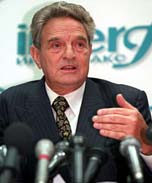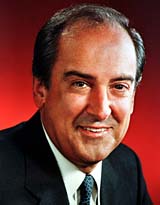
Stock markets slid all over the world after Hong Kong's stock index plunged more than 10 percent, its worst one-day loss in nearly a decade. Investors drove Japan's and England's markets down 3 percent, Germany's down 3.6 percent, Russia's down 5 percent, and the U.S. Dow Jones industrial average down 2.3 percent. The Wall Street Journal online edition put out a big special section under the logo "Turmoil in Hong Kong." The next day, Hong Kong's market made up two-thirds of its loss. But analysts worry that 1) the underlying Asian currency crisis remains and 2) even if U.S. investors panicked unduly, the fact that they did so indicates that they're looking for a good excuse to bail out. (10/24)


Former Cambodian dictator/mass-murderer Pol Pot gave his first interview in nearly two decades. He told the Far Eastern Economic Review: 1) "My conscience is clear." 2) On slaughtering his political adversaries: "We had no other choice," i.e., he had to kill Cambodians in order to keep the Vietnamese from assassinating him and thereby capturing Cambodia. 3) The Vietnamese caused many of the deaths that were blamed on him, and left piles of skulls around Cambodia to make him look bad. 4) In the closest thing to an apology, "Our movement made mistakes." 5) The attack he ordered against a colleague four months ago ended up wiping out the colleague's grandchildren only because of "a mistake of when we put our plan into practice." 6) As his parting lament: "I have nothing to do now."(10/24)

President Clinton announced his plan to reduce global warming. He pushed back the anticipated deadline for reduction of U.S. greenhouse-gas emissions from 2000 to at least 2008, and he proposed to achieve the reduction through tax incentives and free-market devices--particularly "emission rights" that noncomplying companies can buy from complying companies--rather than through rigid regulation or gasoline taxes. Environmentalists and U.S. allies denounced the plan as grossly insufficient, while Republicans and business leaders called it economically destructive and environmentally unnecessary. From this, editorialists concluded that Clinton must be on the right track. The charitable explanation of Clinton's free-market strategy: It maximizes creativity and efficiency. The uncharitable explanation: It's cheap and inoffensive. (10/24)


Campaign-finance news blizzard: 1) Democrats released records showing that in 1996 the Republican National Committee directed GOP donors to give more than $1 million to organizations that helped Republicans in the elections. In some cases, the RNC collected the checks and passed them along. One donation was $500,000 from Philip Morris, solicited by Haley Barbour. 2) Democrats brandished a 1996 interview in which Bob Dole explained how the RNC was outsmarting campaign-spending limits by running "generic" pro-Dole ads. Dole now says he will appear before the Senate investigating committee, and he challenges Clinton to do the same. 3) The Senate committee plans to call Interior Secretary Bruce Babbitt to face questions about his handling of an Indian casino project related to the scandal. 4) Records released by the White House show that Clinton made at least one fund-raising call from the Oval Office. Clinton spinmeister Lanny Davis says it was just "a thank-you call" to fund-raisers. 5) Senate supporters of campaign reform have halted Senate business and are threatening to block all bills for the rest of the year unless the GOP leadership schedules further action on the issue. (10/24)

The Clinton administration endorsed an IRS reform bill that it had opposed previously. The bill would establish an outside board of supervisors, shift the burden of proof from taxpayers to the IRS, and help taxpayers recover costs and damages for unwarranted prosecutions. The White House cover story: Clinton accepted the bill in exchange for Republican concessions. The real story: Clinton preferred jumping on the bandwagon to being run over by it. The subplot: Clinton's shift prevents House Minority Leader Dick Gephardt, who had endorsed the bill already, from using it as an issue against Vice President Gore. The naive spin: The GOP wins the battle to reform the IRS. The sophisticated spin: Clinton wins the war by denying the GOP a 1998 election issue. (See Jacob Weisberg's defense of the IRS in Slate.) (10/22)


News from Russia: 1) The Communist Party backed down from its threat to force a no-confidence vote on President Boris Yeltsin. Instead, the party's boss settled for a weekly TV forum and occasional meetings with Yeltsin. Analysts called it further proof that Russian communism is dead. 2) George Soros pledged an additional $300 million to $500 million to improve Russian schools and medical care and to retrain soldiers for civilian work. The New York Times approvingly compared his gift to Ted Turner's U.N. pledge and contrasted him with American troublemakers who fund Israeli extremists and the Irish Republican Army. (See the quarterly update of Slate's tally of the 60 largest American charitable contributions.) (10/22)

The fund-raising arms race continues: 1) The Republican National Committee has spent almost $800,000 to win a special congressional election in New York. That's more than 12 times the amount allowed by law--but it's legal because the RNC is spending the money on "issue advocacy" ads, the same loophole that GOP leaders accuse President Clinton of exploiting. 2) Clinton and Gore reportedly will become the first president and vice president to headline a $50,000-a-head luxury retreat for donors who want to play golf and discuss policy. 3) The National Republican Senatorial Committee is offering lobbyists a chance to "rub shoulders" with Senate Majority Leader Trent Lott and other Senate leaders at a $6-million dinner. (10/22)

The Justice Department sued Microsoft for alleged antitrust violations. The suit asks a judge to order Microsoft to cease several practices--particularly its rule that PC manufacturers load Internet Explorer onto their machines in order to get Windows 95--on pain of $1 million per day in fines. The legal question: Did Microsoft violate a 1995 settlement agreement? The economic question: Is Microsoft leveraging its operating-system monopoly into an Internet monopoly? (Microsoft has only 30 percent of the browser market compared with Netscape's 60 percent, but is gaining.) The early spins, in order of ascending sophistication: 1) The suit will hurt Microsoft and help Netscape. 2) It won't matter because PC makers will gladly bundle Internet Explorer with their machines, since it's free. 3) The real threat is that the government will try to block Windows 98, which would integrate the browser into the operating system. 4) Microsoft could stop distributing its browser separately from Windows, thereby destroying the government's premise that the browser is a separate product. 5) By the time the courts act, changes in the industry will have rendered the issues moot. (10/21)


Coca-Cola CEO Roberto Goizueta died. Associates were shocked at his sudden demise from lung cancer after a lifetime of heavy smoking. The media celebrated his riches-to-rags-to-riches career: He started as an engineer with a Coke subsidiary in Havana, left behind his family's sugar fortune in Cuba, rose to the top of the company, and turned it into one of Wall Street's great success stories. Analysts forgave his "New Coke" debacle. The Los Angeles Times reminded readers that "he exploited the public's thirst for what is essentially sugared water." (Goizueta's philanthropy earned him third place on the Slate 60. Click here if you missed our previous link.) Meanwhile, AT&T named its new CEO: Hughes Electronics boss Michael Armstrong. Optimists predicted that Armstrong can whip AT&T into shape. Skeptics recalled similar predictions about AT&T's previous CEO-designate, who turned out to be a disaster. (10/20)


Foreign follies: Khmer Rouge rebels said that if they must allow an international tribunal to try Pol Pot for genocide, current Cambodian dictator Hun Sen must be tried for mass murder as well. Analysts fantasize about both results but expect neither. Cuba held one-party elections again. American pundits ignored the elections and instead denounced Fidel Castro for blacking out Game 1 of the World Series, which featured a Cuban defector as the winning pitcher. Denis Sassou Nguesso, renowned for pimping and looting the Congo Republic during his previous tenure as dictator, seized power again. Analysts expect him to get back to the job of pimping and looting. Malaysia's prime minister blamed his country's financial crisis on the Jews. The Sri Lankan navy killed at least 100 Tamil rebels in a pitched sea battle. Americans were surprised to learn that Sri Lanka has a navy. (10/20)


Middle East news: 1) Israel agreed to begin proceedings to extradite an American teen-ager who fled to Israel after allegedly killing a man in Maryland. American Jewish leaders hope the extradition will relieve tensions between Israel and the U.S. Congress, which had moved to suspend aid to Israel. 2) The founder of Hamas announced a suspension of terrorist attacks against Israel but said that the truce would continue only if Israel stops demolishing Palestinian homes, seizing land, and applying economic sanctions. 3) Arab countries are irked that the Turkish military is getting chummy with Israel, particularly in developing missiles. 4) U.S. envoy Dennis Ross returned to Israel to try to restart peace talks. (10/20)

Miscellany: Willamette University junior Liz Heaston became the first woman to play in a college football game. She kicked two extra points, and her team won. Walter Kempner, the German-born "Rice Diet" doctor whose clients included Hollywood stars and a Supreme Court justice, admitted last month--just before dying--that he had whipped some of his patients who strayed from his diet, allegedly at their request. Former House Ways and Means Committee Chairman Dan Rostenkowski was set free after serving more than a year in jail for mail fraud. At Louis Farrakhan's request, some blacks held rallies to honor the second anniversary of the Million Man March, but attendance fell far short of the original event. (See Slate's "Gist" on the Nation of Islam.) Two campaign-reform interest groups are spending thousands of dollars on ads to pressure senators to support legislation that would restrict interest groups from spending thousands of dollars on ads to pressure senators to support legislation. (10/20)
